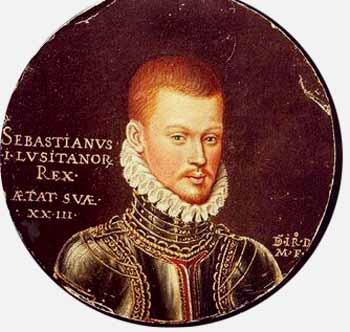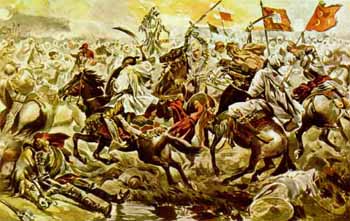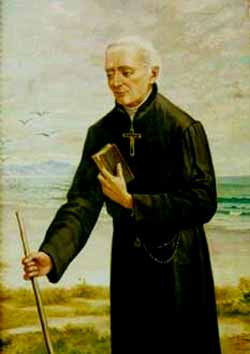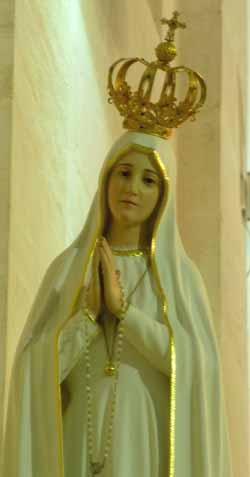 |
History: Personalities
Dom Sebastian’s Legacy
Plinio Corrêa de Oliveira
The hope of the Portuguese people soared on considering the Crusade Dom Sebastian was preparing to make against the Moors in Morocco. With a victory in that battle, he would add yet another title due to the conquest of North Africa to the list of noble titles he already bore: by the grace of God, King of Portugal, Brazil, and the Algarves, King of the Conquest, Navigation and Commerce of Ethiopia, Arabia, Persia and India, etc.

Dom Sebastian at age 23 |
Upon his return to Portugal with that new glory, his prestige would be at its zenith. The honor of the fading Chivalry would shine again. His fidelity to the Church would affirm the medieval thesis that the first purpose of the temporal power is to serve and assist the spiritual power. In face of that brilliant model of a Catholic Prince, the artificial models of the Renaissance - such as Lawrence of Medici and Caesar Borgia - would be discredited. Caesar Borgia, as you may recall, was the son of the corrupt Pope Alexander VI.
To his youth, strength, wealth and good looks, Dom Sebastian would add the glory of a great victory in the battlefield and the certainty that the source of his human gifts and grandeur was the Catholic Faith, whose moral beauty gives the perfect finish to every human quality. Such a victory would be a strong blow against the Renaissance.
This was the hope of those good people of Portugal regarding their King, Dom Sebastian.
A shattered dream
Because of this keyed-up atmosphere of expectation and affection for the young King, Dom Sebastian had to leave Lisbon without announcement or fanfare. He embarked for Africa in 1587, landed there, marched to the interior and entered the Battle of Alcácer Quibir, whose precise circumstances are still uncertain. The result was a catastrophe. The Portuguese army was completely defeated and the King disappeared. He was last seen riding headlong into the enemy lines.
Think about the contrast between the battles of Lepanto and Alcácer Quibir. Lepanto was led by Don Juan of Austria who represented the House of Austria, although he was from an illegitimate branch. He was an illegitimate son of Charles V. At the moment of the Battle of Lepanto he was a good Prince, but both before or after that battle his life was morally irregular. To this man, who stood out as the hero in the battle, Our Lady gave her help and appeared, putting the Turks to fight.

Dom Sebastian's army suffered a defeat at Alcacer Quibir |
In Alcácer Quibir, the Virgin King and model Catholic led the troops, but there is no report of any apparition of Our Lady. The King disappeared in the battle, most probably he was killed. The dream of Portugal was brutally shattered. Despite the goodness of the young King and the hope of Portugal, Our Lady did not appear. She let things go their own way.
Some of you may ask: Why? It would give me great pleasure to tell you that at the crucial moment of the battle, Our Lady appeared and blinded the Arabs. Then the King entered the ranks of the enemies like a lightning bolt and returned with the head of the commander emir atop his lance. I would like to continue saying that afterwards, moved by the vision of Mary and impressed by the King’s example, half of the Arab army converted. How much I would like to tell you that! But this is not what happened.
The opposite took place, and the man who had been prepared by Heaven to win the battle against the Renaissance - which, I am convinced, would have been even more glorious than the victory of the Battle of Lepanto - disappeared. Why did that man not receive the succor of Divine Providence? I do not know. I only know that God has His own designs, and we should adore Him in His wisdom even when we do not understand His plans. It falls to us only to bend our heads with humility and accept it in peace.
Two messages from God

Fr. Anchieta mourned with Portugal at the moment of the defeat |
On the very day that Dom Sebastian died – in an era when the telegraph and other modern means of communications did not exist – God revealed that defeat to two saints. One was Fr. Jose de Anchieta, a missionary here in Brazil. He was walking on the beach where he used to meditate on Our Lady – on such walks he wrote a large collection of poetry in honor of Our Lady – and he received a vision showing him the defeat of the Portuguese army and the death of the King.
With bitter sadness, Fr. Anchieta communicated the vision to some of his companions. The other was St. Teresa of Avila. She had a similar vision of the defeat at the moment of the battle, which was confirmed when the news came some days afterwards. What sadness for the Church! What sorrow for Christendom!
By revealing this loss to His Saints so that they might grieve with Him at the defeat of the Portuguese army and the death of the King, God showed us that it was not His first plan for Dom Sebastian to die, but He had allowed it to happen because of the actions of men. Those revelations were also a proof of the great love He had for Dom Sebastian. This is what we can induce from those revelations.
So, God allowed human History to follow its own path, not only in Portugal, but in all of Europe. Dom Sebastian, who should have been the antithesis of the Renaissance, could not accomplish his mission. The Kings, who should have had him as an archetype, lacked that perfect model of the King-Crusader. Thenceforth, the decadence grew and became irreversible: the abandonment of the ideal of Chivalry and the consequent pursuit for gold, the love of the pleasures of life, the adoration of material things, which would end with the emergence of Communism more than three centuries later.
The fulfillment of the promise
Portugal felt orphaned; it wept and did not want to believe that Dom Sebastian had died. Even into the 19th century there were people in Portugal waiting for the return of Dom Sebastian. He died in the 16th century, but there were people believing he would return. If someone argued with them that no one can live for 300 years, the Sebastianists would respond: “It is possible with a miracle!” And they continued to believe he would return.

Statue of Our Lady at the Basilica of Fatima |
Some time after the battle his body was sent to Portugal. Was it really his body? No one could say it for sure. It is all the more disputable since, some time after that, another body purporting to be his arrived. Thus, there are two places in Portugal that have tombs where supposed bodies of Dom Sebastian rest.
Our Lady wanted Portugal to mourn over the one she had sent and who passed away without fulfilling his mission. What came was a sadness that she inspired, a sadness with the hope that that ideal would return. It was a hope that the flower that was crushed in the storm, the star that fell into the abyss, would come back to Portugal. It was not the promise that Dom Sebastian would return in his physical form, but that Portugal would have another Star-King or Flower-King who would transform that land into a galaxy of stars and a garden of roses. By sending this hope, God showed His great love for Portugal.
In many ways we can say that the promise God sent Portugal with Dom Sebastian and preserved through the centuries was realized at Fátima in a much more elevated way. Our Lady herself came. It was not a Virgin King but the Virgin of Virgins who came in person.
And just as Dom Sebastian should have sent a message to the entire world, Our Lady, taking Portugal as her throne, sent her message to the entire world: not a message of melancholy longing, but a message that was a warning, a hope and an accusation. Just as the myth of Dom Sebastian is wrapped in mystery, so is the message of Fatima. The mystery of a Queen who descends from Heaven to give us a hope that is greater than any human hope.
Thus we see how the hope inspired by Dom Sebastian is in many ways fulfilled by the apparitions of Our Lady in Fatima.
Continued here

Translated from the transcript of the tape
and summarized by A.S. Guimarães
Posted June 7, 2011

Related Topics of Interest
 Dom Sebastian, the Star of Portugal - I Dom Sebastian, the Star of Portugal - I
 The Miracle of Ourique & the Birth of Portugal The Miracle of Ourique & the Birth of Portugal
 Different Types of Nobility Different Types of Nobility
 Blessed Nuno Alvares Pereira, Hero of Portugal Blessed Nuno Alvares Pereira, Hero of Portugal
 The Strength, Glory & Fecundity of Chastity The Strength, Glory & Fecundity of Chastity
 Our Lady Help of Christians Our Lady Help of Christians
 Remember Lepanto! Remember Lepanto!

Related Works of Interest
  

|
History | Home | Books
| CDs | Search | Contact Us | Donate

© 2002-
Tradition in Action, Inc. All Rights Reserved
|
 |
|